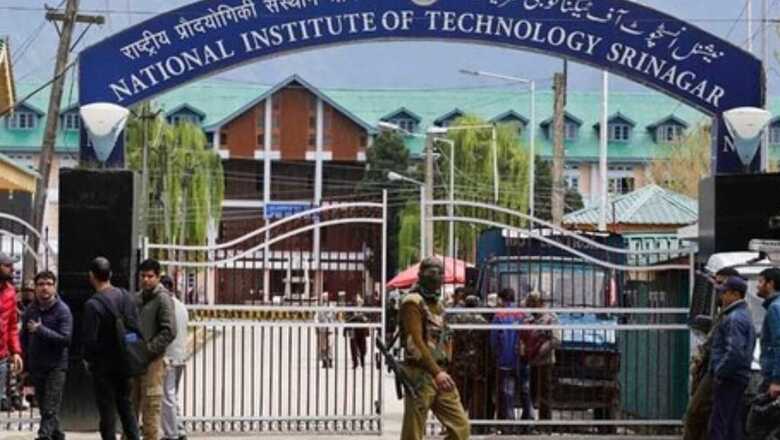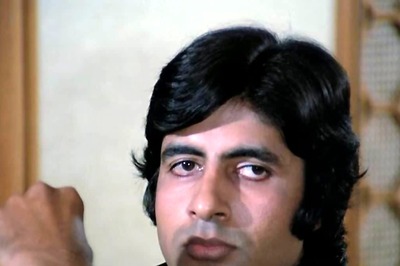
views
The controversy started on November 28, 2023, when a non-local student at the National Institute of Technology (NIT) in Srinagar shared a video on Facebook that allegedly insulted the Prophet Muhammad and hurt the religious sentiments of Muslims. The video was not the student’s own but was taken from YouTube. He claimed that he did not intend to offend anyone but only wanted to share his views on freedom of expression. The post sparked outrage among the local students and staff of the NIT, who staged protests and demanded strict action against the student. They also blocked the gates of the campus and raised slogans.
The NIT administration sent the student on leave and assured them that appropriate action would be taken against him. The police also registered a case against the student under relevant sections of the law and initiated an investigation. The incident also triggered protests in other educational institutions in Srinagar, such as the Kashmir University and the Islamic University of Science and Technology, where students expressed solidarity with the NIT protesters and condemned the blasphemous post. The incident also reminded me of the clashes that took place in the NIT in 2016, when some local students celebrated India’s loss to the West Indies in the T20 World Cup, and the outstation students protested against them.
Blasphemy is a very sensitive and complex topic in Islam. It refers to any disrespectful speech or action against God, His prophet, angels, sacred books, or other sacred symbols of Islam. Different schools of Islamic law have different opinions on what constitutes blasphemy and what are the appropriate punishments for it. Some Muslims believe that blasphemy should be punished by death, while others argue that it should be forgiven or ignored. Blasphemy laws vary by country and region, and some Muslim-majority countries have harsh penalties for blasphemy, such as fines, imprisonment, flogging, or even execution.
The Quran condemns blasphemy and warns blasphemers of humiliation in the afterlife, but it does not prescribe any worldly punishment for it. Some verses are interpreted as forbidding Muslims from insulting other religions, while others are seen as allowing freedom of expression and debate. The Hadiths are reports of the sayings and actions of the Prophet Muhammad and his companions. Some of those Hadiths are used as evidence for prescribing punishments for blasphemy, such as death or exile, while others are used to show that the Prophet forgave or ignored blasphemers. The interpretation and authenticity of these Hadiths are disputed by different scholars and sects, the disagreements and lack of consensus are part of the internal theological dispute in Islam. The classical schools of Islamic law (Hanafi, Shafi, Maliki, and Hanbali) developed various rules and conditions for defining and dealing with blasphemy, depending on the status, intention, and repentance of the blasphemer.
Some Islamic scholars reject the concept of blasphemy and try to educate the Muslim masses about the ignorance prevailing among them. Javed Ahmad Ghamidi is a Pakistani scholar who has challenged the validity and necessity of blasphemy laws in his country. He argues that blasphemy is not a crime but a grave sin against God and His Prophet, and so it cannot be punished by the law. He also contends that the Hadiths that prescribe death for blasphemy are weak and unreliable and that the classical jurists misinterpreted them. He says that the Quran does not prescribe any worldly punishment for blasphemy but only warns of the consequences in the afterlife. He also advocates for freedom of expression and tolerance and criticises the misuse of blasphemy laws to suppress dissent and incite violence. Yet, for his views, Ghamidi himself cannot live in Pakistan and has taken asylum abroad, an indication of how tough it is to reason with a radicalised population.
Mustafa Akyol is a Turkish scholar who has written extensively on the issue of blasphemy in Islam. He argues that blasphemy laws are not Islamic, but a product of political and historical factors. He and Ahmet T Kuru, another Turkish academician and author, say that the Quran does not mandate any punishment for blasphemy but only advises Muslims to avoid insulting other religions. He also points out that the Prophet Muhammad forgave or ignored many of his blasphemers, and that the classical jurists imposed various conditions and restrictions on applying the death penalty for blasphemy. He also calls for a reform of Islamic law and respect for human rights and pluralism.
Ahmet T Kuru is a professor of political science at San Diego State University and the author of the book Islam, Authoritarianism, and Underdevelopment. He has written several articles on the politics of blasphemy in Muslim countries, especially Pakistan. According to him, blasphemy laws historically emerged to serve the political and religious authorities, and they continue to have a role in silencing dissent in many Muslim countries. He argues that the Quran does not require punishing sacrilege and that the conservative Islamic scholars, or ulema, base their case for blasphemy and apostasy laws on a few reported sayings of Prophet Muhammad, known as Hadith, which are rejected by many Islamic scholars and Muslim intellectuals as radical. He also claims that criminalising blasphemy and apostasy is more political than religious and that these laws are popular among some Muslims because they reflect their frustration with the economic and political problems in their countries. He suggests that Muslim countries need to reform their blasphemy and apostasy laws and adopt more democratic and pluralistic approaches to governance and society.
Another Australian scholar Abdullah Saeed has examined the issue of blasphemy in Islam from a historical and comparative perspective. He argues that blasphemy laws are not consistent with the Quranic principles of justice, mercy, and compassion. He also asserts that blasphemy laws are not compatible with the modern values of democracy, human rights, and freedom of expression and suggests that blasphemy laws have turned Muslim countries into killing fields and that they need to be abolished or reformed.
In the modern Muslim world, blasphemy laws are influenced by political, social, and cultural factors. Some states and radical groups have used blasphemy charges to suppress dissent, silence critics, and incite violence. Some Muslim intellectuals and activists have challenged the validity and necessity of blasphemy laws and advocated for human rights, pluralism, and tolerance. Blasphemy accusations have sparked international controversies and conflicts, such as the Salman Rushdie affair, the Danish cartoons, and the Charlie Hebdo attacks. Therefore, the Kashmiri society needs to grow up and get used to offences against Islam, its icons, and the scriptures. This is the 21st century and any slight to religion becoming a pretext to go on a killing spree and stage ‘sar tan se juda’ rallies signifies the emotional immaturity of a culture and civilisation.
In navigating the complexities of blasphemy in Islam, it becomes evident that interpretations vary widely among scholars, reflecting the diverse perspectives within the Muslim community. The recent incident at NIT Srinagar serves as a stark reminder of the sensitivity surrounding this issue and the potential for such events to incite protests and demand legal action. As the Muslim world grapples with the implications of blasphemy laws, scholars like Javed Ahmad Ghamidi, Mustafa Akyol, and Abdullah Saeed advocate for a nuanced understanding, challenging the validity of such laws and emphasising the importance of human rights, freedom of expression, and tolerance. In this evolving discourse, the path forward involves a delicate balance between respecting religious sentiments and upholding fundamental principles of justice, mercy, and compassion.
The author is a writer and an educationist from Srinagar. Views expressed in the above piece are personal and solely those of the author. They do not necessarily reflect News18’s views.



















Comments
0 comment